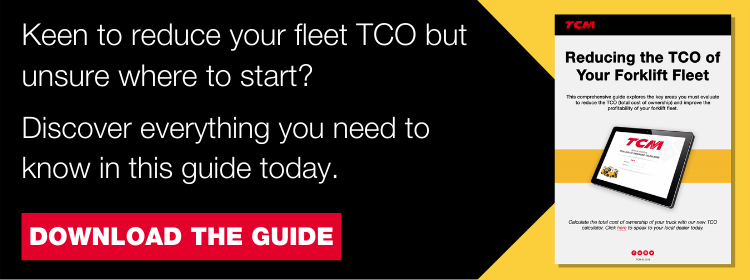On May 15th, 46 delegates joined us in Budapest for The TCM Dealer Conference 2018 to discuss the future of the material handling industry and the key trends shaping it.
The material handling industry is currently being driven by regulations and legislation that will one day transform the industry. In light of fundamental changes to the way the industry operates (including EU directives, new engine technology, and the 2030 ban on petrol and diesel engines), businesses must adapt or else risk getting left behind.

The continued digitalisation of the material handling industry is one way in which businesses are building new processes and agility into their operations. The conference examined the phenomenal opportunities that Industry 4.0 is offering businesses through the lenses of mass globalisation, connectivity, the Internet of Things (IoT), and emerging technology.
Mass globalisation impacts business markets and trade
Industry 4.0 is already granting corporations the ability to operate in a truly global context.
The world has never been more closely connected. Since 1960, international exports have increased by over 1,600%. The logistics industry is now only trailing retail and manufacturing, providing 7.5% of all workplaces in the EU. As a result, goods can be transported with more ease and speed, while an increase in free trade means direct economic benefits for businesses with the foresight and technology to expand their markets.
Increasing connectivity transforms customer relationships
The things that make us human will never change. The way that we connect with each other already has.
To gain a competitive advantage today and future-proof operations tomorrow, businesses must identify areas where they can add value and differentiate themselves above and beyond their competitors. From social media channels to machine learning technology, it has never been easier for businesses to access the data they need to achieve this, enabling them to capitalise on and further improve material handling and wider business operations.
IoT technology revolutionising fleet management
Modern call forward and battery management systems inform and communicate via electronic networking globally, enabling remote management control anywhere at any time.
Implementing these technologies across organisations will significantly streamline processes and reduce costs, while the data they collect, store, and share can be used to make more informed business decisions across the organisation.
The rate at which IoT advances will never be slower than it is today. From the systems described above to increasingly smart technologies connecting all your vehicles, advances in IoT technology are set to have direct impacts on the future of fleet management.
Advancing technology future-proofs material handling
The way in which businesses typically run and manage their operations today will have to change ahead of the 2030 ban on petrol and diesel vehicles.
The electrification of vehicles brings with it questions of its own. Will material handling vehicles recharge from the grid or access renewable energy, and how will they store it to improve efficiency and minimise disruption between staff or shift changeovers?
To reduce disruption and implement change as smoothly and cost-effectively as possible, it is essential that businesses start thinking about how they will address these challenges now.
Our industry has developed electric products such as lithium-ion batteries (LIBs), but this should not be seen as the only solution when considering ways to future-proof your business when thinking about electric vehicles. TCM has developed an approach with its network that starts with some simple tools, matching the correct products to customer applications that are the most cost-effective, and more importantly correct for each operation.
Ultimately businesses of today need to know they have a supplier that takes into account the best solution and delivers limited disruption when implementing change. This must be carried out as smoothly and cost-effectively as possible, and it is essential that businesses start thinking about how they will address these challenges now.
Closing the knowledge gap between your corporation and the future
The world could look very different in even five years’ time, and corporations around the globe must prepare for this. The advent of Industry 4.0 stands to empower businesses, but digitalisation represents a fundamental change to the way businesses operate, meaning it must be driven from the top.
A knowledge gap currently exists between what people understand about the changes set to impact the industry and what is already happening. By raising awareness of these challenges and delivering innovative material handling equipment, services, and solutions, we hope to close that gap and drive the evolution of corporations in a new strategic direction.
Subscribe to our material handling blog and keep up to date with the latest material handling news and insights.


